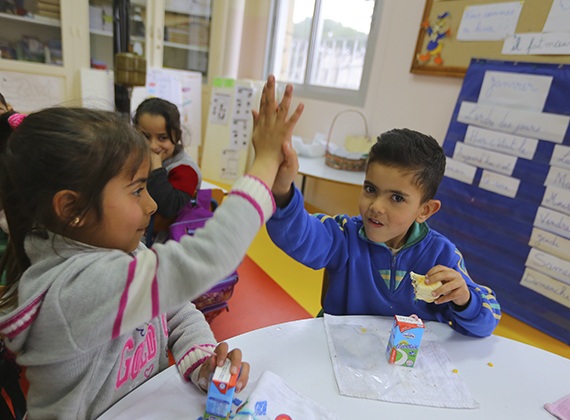2019 – Improving school attendance among refugee children in Syria and Lebanon – Tetra Pak
A new school milk programme in Syria and Lebanon is helping boost nutrition, improve enrolment and decrease drop-out rates among refugee school children
Challenge
The crisis in Syria has led to millions of displaced people, in Syria and its neighbouring countries. It is difficult to provide schooling in times of war, and many refugee families hesitate to send their children to school.
By the end of the 2017 school year, of the 1.7 million registered school-age Syrian refugee children, over 40 percent were not attending school. Less than half of the children who start primary school complete it. Among refugee children, only 2 percent attend secondary school. The lack of education for a large group of children has far-reaching and long-term negative impacts.
Initiatives
The school milk programmes in Syria and Lebanon aim to attract children back to school and improve nutrition, in a situation where few have reliable access to good food.
The World Food Programme (WFP) was assigned to implement the Syria School Milk Programme, starting in January 2017. Tetra Pak customers, Glanbia in Ireland, Lactogal in Portugal and ILAS in Spain, will supply UHT milk in Tetra Brik® Aseptic cartons to 350,000 Syrian children as part of a support package from European farmers. The European Commission is funding the programme with €30 million.
Meanwhile, in neighbouring Lebanon, our customer LibanLait is supplying locally-produced UHT milk to Lebanese schools via two programmes: in collaboration with the WFP and Lebanese Ministry of Education, and with the NGO Theirworld.
Value
Initial results from the programmes show improvements in children’s access to education, learning outcomes, health and wellbeing. The percentage of students missing school has dropped from 8.4 percent to 4.9 percent.
Furthermore, there is a marked increase in healthy weights among children attending both morning and afternoon school sessions. In the morning shift, the percentage of overweight children has decreased from a baseline of 10.8 percent to 9.6 percent; in the afternoon shift, the respective drop is from 6.2 percent to 3.7 percent.
“Theirworld’s breakfast snack programme is underpinned by a robust research model, and we can see improvements in students’ diet diversity from previous years. This, combined with reduced dropout rates, is proof of how needed and impactful the provision of a daily nutritious snack and milk can be for children to support their learning.” – Kimberley Green, Project Manager Safe Schools.
Looking ahead
Looking ahead, the programmes are helping build capacity for future generations, both in times of crises and hopefully, in times of peace.


Leave a Reply
You must be logged in to post a comment.